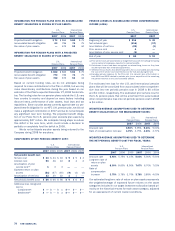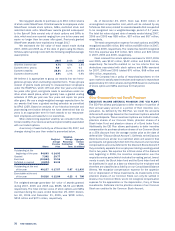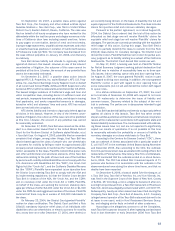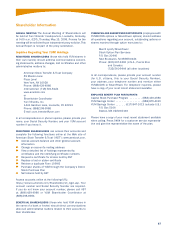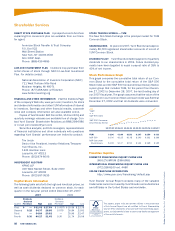Pizza Hut 2007 Annual Report Download - page 78
Download and view the complete annual report
Please find page 78 of the 2007 Pizza Hut annual report below. You can navigate through the pages in the report by either clicking on the pages listed below, or by using the keyword search tool below to find specific information within the annual report.82 YUM! BRANDS, INC.
On December 19, 2003, counsel for plaintiff in the above
referenced Johnson lawsuit, filed a separate demand for arbitra-
tion with the American Arbitration Association (“AAA”) on behalf
of former LJS managers Erin Cole and Nick Kaufman (the “Cole
Arbitration”). Claimants in the Cole Arbitration demand a class
arbitration on behalf of the same putative class—and the same
underlying FLSA claims—as were alleged in the Johnson lawsuit.
The complaint in the Cole Arbitration subsequently was amended
to allege a practice of deductions (distinct from the allegations
as to the Policy) in violation of the FLSA salary basis test. LJS
has denied the claims and the putative class alleged in the
Cole Arbitration.
Arbitrations under LJS’s DRP, including the Cole Arbitration,
are governed by the rules of the AAA. In October 2003, the AAA
adopted its Supplementary Rules for Class Arbitrations (“AAA
Class Rules”). The AAA appointed an arbitrator for the Cole
Arbitration. On June 15, 2004, the arbitrator issued a clause
construction award, ruling that the DRP does not preclude class
arbitration. LJS moved to vacate the clause construction award in
the United States District Court for the District of South Carolina.
On September 15, 2005, the federal court in South Carolina ruled
that it did not have jurisdiction to hear LJS’s motion to vacate.
LJS appealed the U.S. District Court’s ruling to the United States
Court of Appeals for the Fourth Circuit.
On January 5, 2007, LJS moved to dismiss the clause con-
struction award appeal and that motion was granted by the Fourth
Circuit on January 10, 2007. While judicial review of the clause
construction award was pending in the U.S. District Court, the
arbitrator permitted claimants to move for a class determination
award, which was opposed by LJS. On September 19, 2005, the
arbitrator issued a class determination award,certifying a class of
LJS’s RGMs and ARGMs employed between December 17, 1998,
and August 22, 2004, on FLSA claims, to proceed on an opt-out
basis under the AAA Class Rules. That class determination award
was upheld on appeal by the United States District Court for the
District of South Carolina on January 20, 2006, and the arbitrator
declined to reconsider the award. LJS appealed the ruling of the
United States District Court to the United States Court of Appeals
for the Fourth Circuit. On January 28, 2008, the Fourth Circuit
issued its ruling, affirming the decision of the District Court, and
thereby affirming the class determination award of the arbitrator.
LJS is currently considering the merits of an appeal to the United
States Supreme Court.
In light of the decision of the Fourth Circuit, LJS now believes
that it is probable the Cole Arbitration will proceed on a class
basis, governed by the opt-out collective action provisions of the
AAA Class Rules. LJS also believes, however, that each individual
should not be able to recover for more than two years (and a
maximum three years) prior to the date they file a consent to
join the arbitration. We have provided for the estimated costs of
the Cole Arbitration, based on our current projection of eligible
claims, the amount of each eligible claim, the estimable claim
recovery rates for class actions of this type, the estimated legal
fees incurred by the claimants and the results of settlement
negotiations in this and other wage and hour litigation matters.
But in view of the novelties of proceeding under the AAA Class
Rules and the inherent uncertainties of litigation, there can be
no assurance that the outcome of the arbitration will not result
in losses in excess of those currently provided for in our Consoli-
dated Financial Statements.
On September 2, 2005, a collective action lawsuit against
the Company and KFC Corporation, originally styled Parler v. Yum
Brands, Inc., d/b/a KFC, and KFC Corporation, was filed in the
United States District Court for the District of Minnesota. Plaintiffs
allege that they and other current and former KFC Assistant Unit
Managers (“AUMs”) were improperly classified as exempt employ-
ees under the FLSA. Plaintiffs seek overtime wages and liquidated
damages. On January 17, 2006, the District Court dismissed the
claims against the Company with prejudice, leaving KFC Corpora-
tion as the sole defendant. Plaintiffs amended the complaint on
September 8, 2006, to add related state law claims on behalf
of a putative class of KFC AUMs employed in Illinois, Minne-
sota, Nevada, New Jersey, New York, Ohio, and Pennsylvania. On
October 24, 2006, plaintiffs moved to decertify the conditionally
certified FLSA action, and KFC Corporation did not oppose the
motion. On June 4, 2007, the District Court decertified the col-
lective action and dismissed all opt-in plaintiffs without prejudice.
Subsequently, plaintiffs filed twenty-seven new cases around the
country, most of which allege a statewide putative collective/class
action. Plaintiffs also filed 324 individual arbitrations with the
American Arbitration Association (“AAA”). KFC filed a motion with
the Judicial Panel on Multidistrict Litigation (“JPML”) to transfer
all twenty-eight pending cases to a single district court for coordi-
nated pretrial proceedings pursuant to the Multidistrict Litigation
(“MDL”) statute, 28 U.S.C. § 1407. KFC also filed a motion with
the Minnesota District Court to enjoin the 324 AAA arbitrations
on the ground that Plaintiffs waived the right to arbitrate by their
participation in the Minnesota (Parler) litigation. Finally, KFC filed
a motion in the new Minnesota action to deny certification of a
collective or class action on the ground that Plaintiffs are judicially
and equitably estopped from proceeding collectively on behalf of a
class in light of positions they took in the Parler case. The Court
denied KFC’s motion without prejudice. On January 3, 2008, the
JPML granted KFC’s motion to transfer all of the pending court
cases to the Minnesota District Court for discovery and pre-trial
proceedings. On January 4, 2008, KFC’s motion to enjoin the 324
arbitrations on the ground that plaintiffs have waived their right
to arbitrate was granted.
We believe that KFC has properly classified its AUMs as
exempt under the FLSA and applicable state law, and accordingly
intend to vigorously defend against all claims in these lawsuits.
However, in view of the inherent uncertainties of litigation, the out-
come of this case cannot be predicted at this time. Likewise, the
amount of any potential loss cannot be reasonably estimated.
On August 4, 2006, a putative class action lawsuit against
Taco Bell Corp. styled Rajeev Chhibber vs.Taco Bell Corp. was filed
in Orange County Superior Court. On August 7, 2006, another
putative class action lawsuit styled Marina Puchalski v. Taco Bell
Corp. was filed in San Diego County Superior Court. Both lawsuits
were filed by a Taco Bell RGM purporting to represent all current
and former RGMs who worked at corporate-owned restaurants in
California from August 2002 to the present. The lawsuits allege
violations of California’s wage and hour laws involving unpaid over-
time and meal and rest period violations and seek unspecified
amounts in damages and penalties. As of September 7, 2006,
the Orange County case was voluntarily dismissed by the plaintiff
and both cases have been consolidated in San Diego County.
Discovery is underway, with pre-certification discovery cutoff set
for June 2, 2008 and a July 1, 2008 deadline for plaintiffs to file
their motion for class certification.
Taco Bell denies liability and intends to vigorously defend
against all claims in this lawsuit. However, in view of the inherent
uncertainties of litigation, the outcome of this case cannot be
predicted at this time. Likewise, the amount of any potential loss
cannot be reasonably estimated.




